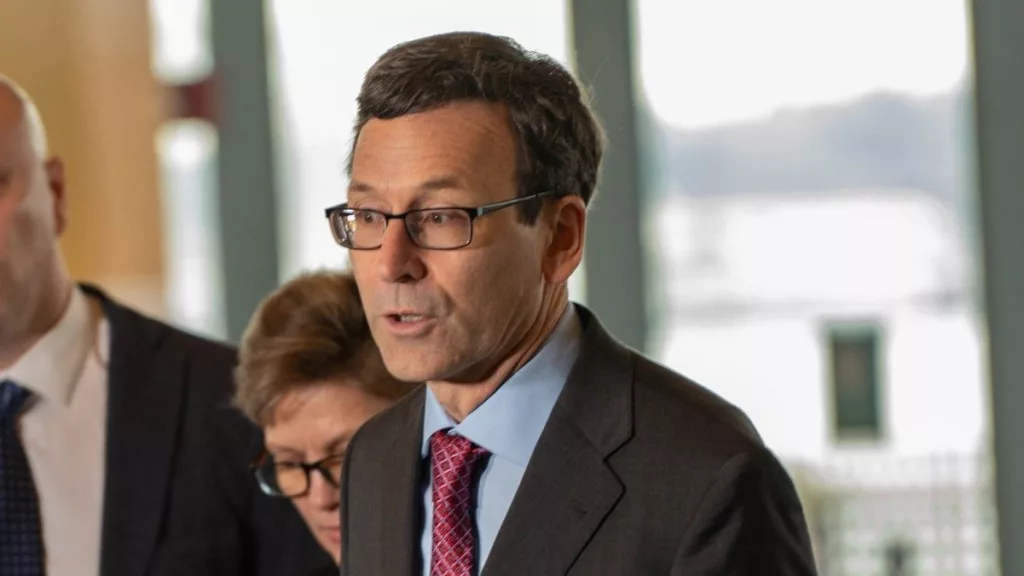OLYMPIA, WA – Corporate titans. Bank executives. Restaurant operators. Airplane owners.
They’re all trying to convince Washington Gov. Bob Ferguson that there are problems with the tax bills on his desk, and they are suggesting vetoes as a fix. Not surprisingly, they say the provisions drawing their antipathy will cost them, and by extension their customers, more money.
Ferguson has received written requests from hundreds of people and groups hoping to influence him ahead of Tuesday, the deadline to make decisions on pending bills.
He can sign or veto them entirely. He could veto a part, then sign what’s left into law. If the governor fails to act on a bill by the deadline, it would become law without his signature.
Whether he’ll wield the veto pen with such force as to require summoning the Legislature into special session is unknown. Rejecting the entire operating budget certainly would.
Ferguson could be tactical and veto a prong in a tax bill that the next two-year budget is not dependent on, for example. Lawmakers could make any course corrections next session.
“Each day, we make some decisions and delay others,” Ferguson said Wednesday. “Some are a little more complicated, so we’ll keep talking.”
Here’s a glance at some of the folks trying to bend Ferguson’s ear their way.
The big one
House Bill 2081 is the most far-reaching of tax bills pushed through by majority Democrats over Republican opposition. It’s got five parts that are projected to generate $2.1 billion in the next budget and $5.6 billion over four years.
It has an across-the-board boost in business taxes, temporary surcharge on high-grossing firms and higher tax rates on large financial institutions and computing giants.
A number of companies and organizations are pressing Ferguson to remove the three-year surcharge for companies grossing more than $250 million. Among them are the Washington Hospitality Association and Washington Food Industry Association, who say it will drive up costs of food sold in restaurants and by independent grocers.
The Associated General Contractors want the whole bill vetoed. In its letter, the organization said the business tax increase will result in higher bids, driving up the cost of housing, schools, roads, and bridges.
“This could lead to delayed or canceled projects, job losses, and ultimately reduced state revenues,” executives with the group wrote
Sales tax on services
Senate Bill 5814, the other major money-maker, is relied on to raise $1.1 billion for the next budget, mostly by applying the retail sales tax to more services, such as digital advertising and temporary staffing.
A coalition of streaming services, including Netflix, Paramount+, Peacock, and the Walt Disney Co., argues the new ad tax will lead to higher costs for customers or fewer options if services leave the market. They also think it may be challenged in court.
“Singling out one segment of the ad economy for this kind of discriminatory treatment is the wrong way to address the state’s fiscal needs and would do far more harm than good,” the Streaming Innovation Alliance told the governor.
The American Staffing Association wants Ferguson to pull temporary staffing services from the bill. Nearly 266,000 residents were employed through temporary or contract positions in 2023, it said.
“A sales tax on staffing services effectively raises the cost of labor, which research shows will lead to reduced demand for temporary work,” wrote Toby Malara, the association’s vice president of government relations.
There is also a provision to begin taxing certain products with nicotine, like Zyn pouches, on Jan. 1, 2026.
PMI US Corporate Services, better known as Philip Morris International, wants it removed. “This would be the highest tax rate on nicotine pouches in the nation, and more importantly, would tax nicotine pouches at a higher rate than combustible cigarettes,” the company noted in its letter.
Ending tax breaks
Senate Bill 5794 aims to bring in $148.5 million by getting rid of tax breaks enjoyed by around 4,000 taxpayers. Ferguson is hearing from those who don’t want to lose the perks.
Operators of self-service storage facilities are one group. They would begin to pay taxes on the renting or leasing of individual units. They contend it’s not legal and urge Ferguson to view such a tax with skepticism as he did the now-discarded wealth tax. They attached an analysis from attorney Philip Talmadge, a former state Supreme Court justice, to drive home their point.
“Self-storage is not a luxury — it is a lifeline for thousands of working- and middle-class Washingtonians. Taxing it under a constitutionally dubious statute will only raise costs and undermine the integrity of our state’s tax system, while inviting a lawsuit the State will struggle to defend,” wrote Lance Baker, president of the Washington Self Storage Association.
Community banks are pleading to preserve a deduction for first mortgage interest income. Eliminating it will increase their taxes and they say those costs will get passed on.
“Your administration has consistently emphasized the urgent need to expand housing supply and make homeownership more accessible,” wrote Jolene Riggs, executive vice president and chief financial officer of Baker Boyer National Bank in Walla Walla. “This added expense will force lenders to increase interest rates and fees, or reduce lending, making homeownership less attainable for the very families you seek to support.”
Taxing Tesla
House Bill 2077 would begin taxing the sale of electric vehicle credits between automakers. This has been dubbed the “Tesla tax” because the firm led by Elon Musk is the only automaker with credits to sell in Washington. Tesla opposes it, saying it will slow Washington’s push to sell more electric vehicles.
“Governments don’t tax or penalize overcompliance because it’s contradictory to the stated program goals,” Tesla executive Noelani Derrickson wrote, adding “it sets up a bizarre and unprecedented taxing scheme.”
Ford Motor Co., Rivian Automotive, and the Alliance for Automotive Innovation also want brakes applied to the new tax, which is counted on to generate $54.5 million for the operating budget.
Road revenue
Senate Bill 5801 is the $3.2 billion transportation revenue package. The marquee item is a 6-cent increase in the state’s gas tax. There’s lots more in it, like a bump up in the cost of vehicle weight fees and fees for getting rid of old tires.
Another component increases the state tax on diesel by 3 cents in July and another 3 cents in 2027. The Washington Trucking Association asked this to be crossed out.
Most requests concerning this bill were from opponents of a new 10% “luxury aircraft tax.” It would apply to non-commercial planes and be levied on the portion of the selling price above $500,000.
In a joint letter, the Washington State Aviation Alliance and seven other groups told Ferguson that assuming that “because aircraft are expensive and therefore ‘a luxury item’ reflects a grossly uninformed understanding” of how non-commercial aircraft are used in communities.
They are “tools that provide essential services for people of ALL classes, not just the wealthy,” reads the April 28 letter.
Rhys Spoor, a pilot and president of the Stuart Island Airway Park Association in Friday Harbor, was more blunt in summing up his argument.
“You already have enough in taxes and should be required as a public servant to live within a frugal budget, just like most of the rest of us have to do,” he wrote.
This story first appeared on Washington State Standard.





